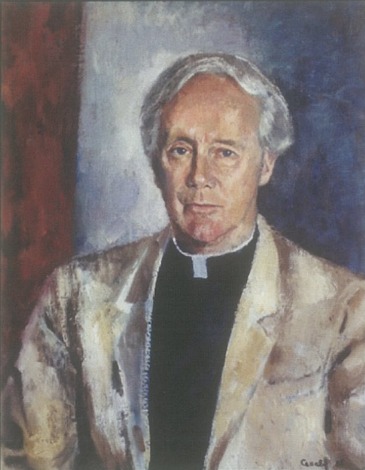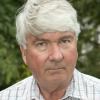Homily for the late Fr Emmet P. Costello SJ, St Mary's North Sydney, 21 October 2013.
 In his 90th year, Emmet P. Costello was determined to be here to witness the events of 7 September 2013. He stayed amongst us for almost another 40 days and 40 nights. All is now accomplished. Now he is on that holy mountain where the Lord of hosts will prepare for all peoples a banquet of rich food. To the end, Emmet was a son of Ignatius, a man of the Church, and a counsellor to many. He loved the Jesuits, the Church, and the Australian polity, while always lamenting the state of each as only a true devotee and committed member could.
In his 90th year, Emmet P. Costello was determined to be here to witness the events of 7 September 2013. He stayed amongst us for almost another 40 days and 40 nights. All is now accomplished. Now he is on that holy mountain where the Lord of hosts will prepare for all peoples a banquet of rich food. To the end, Emmet was a son of Ignatius, a man of the Church, and a counsellor to many. He loved the Jesuits, the Church, and the Australian polity, while always lamenting the state of each as only a true devotee and committed member could.
In the preface of the second edition of his book Christ My Brother he had written with his characteristic bravado and connection to persons in authority:
Some years ago Cardinal Martini, the brilliant Archbishop of Milan, said to me: 'This is 1996 but some in the Church are talking as though it was 1966, or worse as though it was 1866!' Is the Church keeping abreast of the times? After Vatican II, Cardinal Suenens, Primate of Belgium a most powerful force of great vision at the Council, wrote: 'Suddenly we realised we were entering a new century every ten years.
With Em, we were only one handshake or one conversation away from the great movers, shakers and events in the Church and the world. Many of you gathered in this Church today have an intimate story about Emmet's friendship and pastoral solicitude for you and your children as you wrestled with the relevance of your personal faith and the teachings of the institutional church in your busy worldly lives. Emmet may have taught you or your boys at school. He may have celebrated one of his 10 minute masses with you at home. He stood by you in the good times and in the bad. He gave wise counsel, if only by listening, on all manner of things from the spiritual to the intensely material. He assured you that though the state of Jesus Christ was divine, yet he did not cling to his equality with God but emptied himself ... and became as we are; and being as we all are, he was humbler yet; Jesus became a brother to us all, a friend of us all.
Christ asked his disciples: 'Who do people say that I am?' Emmet wrote, it was Peter who made the stupendous act of faith: 'You are the Christ the Son of the Living God'. Emmet never tired of insisting that Christ was divine as Son of God and human as our brother. In good times and in bad, in the midst of wealth and poverty, amongst the powerful and the downtrodden, Emmet always brought us back to 'this interpersonal relationship with Christ as brother and totally compassionate friend, fully and perfectly human, like us in everything, sin alone excepted'.
One of my abiding memories of Emmet is the recessional out of St Mary's Cathedral at the conclusion of this parish's sesquicentenary mass in 2006. I happened to be the concelebrant who processed out, next to Emmet who conducted himself like a vice regent with the walking stick and the affectionate wave to parishioners in every second pew. Behind every smile was a story to which only he and the parishioner were privy — at least until we arrived in the sacristy whereupon I received an extensive pastoral debriefing on those in attendance. I forget what organ voluntary was playing but it should have been Elgar's Pomp and Circumstance.
Emmet nurtured our friendship and tended us spiritually, not just through his presence and preaching but also through his life time apostolate of reading and writing. On the eve of the great feasts many of you received the newssheet of succinct points for spiritual reflection. The author Costello mastered the art of summing up his message in punchy, unadorned points. Here is the opening paragraph of Christ My Brother:
The modern age, better educated than ever before, is questioning everything and the Church is subject to ever increasing scrutiny. The Church is divine and human, often very human in its lack of vision and limitations. It always has been and always will be — but we must see beyond the human defects to the centrality of Christ who is all perfect.
Those of us who lived with Emmet were used to history lessons at breakfast when we would be schooled over our Weeties in the shortcomings of the popes, the modest breeding of papal nuncios, and the march of folly of great world leaders. Churchill, Stalin and Hitler were daily fare. Over that first morning coffee, we would be given a reading list to last a month. Many of you then received the same lessons over the family dinner table at night or at one of the city's more fashionable dining establishments like Machiavelli's. One of Emmet's favourite books was Peter Hebblethwaite's biography of Paul VI — a pope, like John XXIII, who had a closer place in his heart than the recent incumbents, except of course the Jesuit Francis. We often heard the story of Paul VI's dignified meeting with Emmet and his angelic mother here in Sydney. Pope Paul VI said to him, 'Always trust in Christ. Put no limits to his love and power — in everything and at all times.' As Emmet later wrote: these were 'words engraved in my mind and heart forever. If ever I experienced the love and warmth of Christ in another person, it was Paul VI.' Hebblethwaite tells us that Paul VI's claim to understand the modern world was at the very heart of his pontificate, as it was of Emmet's ministry. Paul VI's address to the final session of Vatican II inspired Emmet the priest. Pope Paul said:
At the Council the Church has been concerned not just with herself and her relationship of union with God, but with man — man as he really is today, living man, man wrapped up all in himself, man who makes himself not only the centre of his every interest but dares to claim that he is the principle and explanation of all reality.
Vatican II's Pastoral Constitution on the Church in the Modern World, Gaudium et Spes, was Emmet's guiding light, urging us to be 'witnesses of the birth of a new humanism, one in which we are defined first of all by our responsibility towards our brothers and sisters and towards history'.
Espousing that new humanism with a love of his brothers and sisters and history, Emmet always embraced the new technology and any novel means of communication. We all remember that distinguished photo of Emmet with his laptop in the crypt of St Mary's Cathedral, launching his website. Even Judy Cassab would have been hard pressed to match the colour and texture of that photo of the new age Jesuit who delighted in the wonders of the web. In Christ My Brother he wrote:
Christ was the greatest communicator of all times and master of the brief, simple statement in his preaching and parables. Simple, direct preaching, in the language of our times, on the true humanity and brotherhood of Christ, is surely the most urgent need of our critical age, to satisfy the spiritual hunger of this generation, which deep down, and often without realizing, yearns for the spiritual values which only Christ can satisfy.
Emmet was of a generation of Australian Jesuits who dedicated the prime of their lives with chalkdust teaching schoolboys to be generous and not to count the cost, to fight and not to heed the wounds, to toil and not to seek for rest, to labour and not to ask reward save that of knowing that they do the Lord's holy will. In an age when religious faith and observance are fragile, these Jesuits have justifiably taken pride in alumni who have persevered in faith, hope and love. They have also taken delight in those alumni who have dedicated themselves to lives of service in the Church and in the professions and in providing assistance to the poor and marginalised. For the moment that generation of Jesuit teachers enjoys the fruits of their educational labours, seeing Jesuit alumni on the national stage of public service as prime minister, chief justice, leader of the opposition, treasurer, minister for education and minister for agriculture.
Having come from a family of means, Emmet constantly reminded us of the gospel questions: What gain, then, is it for anyone to win the whole world and ruin his life? And indeed what can anyone offer in exchange for his life? Once on the feast of St Aloysius Gonzaga, Emmet preached to the boys that the goings on of the sixteenth century Gonzaga family would have made the party antics of the contemporary Aloysians look like afternoon tea in the convent parlour with Mother Superior. He never affected surprise or dismay at the worldly carryon of any schoolboy or adult. He was always on hand to remind both the larrikin and the respected community leader that Christ was their brother.
It's often been reported that when Sir Warwick Fairfax lay dying Emmet was with him as he took his last breath, saying, 'Dear Warwick, have no worries. Just give yourself over to Christ with boundless optimism.' Last Tuesday morning, the nurse brought Emmet back to his room from the breakfast table. He was not feeling well. He simply said, 'I don't wish to talk anymore.' When the nurse returned a few minutes later, he had breathed his last. He died alone having given himself over to Christ with boundless optimism. The last word goes to Emmet and his brother Christ:
Since Christ is our brother, then prayer becomes easy and a joy because we are talking to our greatest friend who has unlimited power to help us in every way. And regardless of the inevitable crosses and trials of life, we can view our lives with boundless optimism, recalling Christ's words:
It is I. Fear not.
Have confidence. I have overcome the world.
I am with you all days, even to the end of time.
May the great Jesuit teacher rest in peace.
 Fr Frank Brennan SJ is professor of law at Australian Catholic University, and adjunct professor at the College of Law and the National Centre for Indigenous Studies, Australian National University.
Fr Frank Brennan SJ is professor of law at Australian Catholic University, and adjunct professor at the College of Law and the National Centre for Indigenous Studies, Australian National University.
Scripture references in italics in this homily are taken from Isaiah chapter 25 verses 6–9, Philippians chapter 2 verses 5–11 and Mark chapter 8 verses 27–38.
Portrait of Emmet Costello SJ by Judy Cassab.